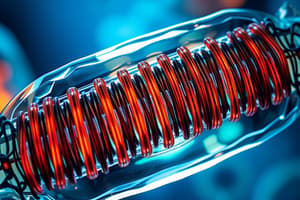Podcast
Questions and Answers
What is the primary function of the cell membrane in a biological cell?
What is the primary function of the cell membrane in a biological cell?
- To store genetic information
- To control the movement of substances in and out of the cell (correct)
- To generate energy for the cell
- To facilitate protein synthesis
Which process is responsible for the production of ATP in cellular respiration?
Which process is responsible for the production of ATP in cellular respiration?
- Lactic acid cycle
- Electron transport chain (correct)
- Glycolysis
- Fermentation
How do enzymes affect chemical reactions in biological systems?
How do enzymes affect chemical reactions in biological systems?
- They increase the activation energy required
- They serve as reactants in the reactions
- They lower the activation energy, increasing the reaction rate (correct)
- They slow down the reaction rate
Which statement describes homologous chromosomes?
Which statement describes homologous chromosomes?
What role do ribosomes play in the cell?
What role do ribosomes play in the cell?
Flashcards are hidden until you start studying
Study Notes
Cell Membrane Function
- Serves as a protective barrier, maintaining the integrity of the cell's internal environment.
- Regulates the movement of substances in and out of the cell through selective permeability.
- Facilitates communication and signaling with other cells through receptor proteins.
Cellular Respiration and ATP Production
- ATP production primarily occurs through cellular respiration processes: glycolysis, the Krebs cycle, and oxidative phosphorylation.
- Oxygen plays a crucial role in aerobic respiration, enhancing ATP yield compared to anaerobic processes.
Enzyme Function in Reactions
- Enzymes are biological catalysts that speed up chemical reactions by lowering activation energy.
- They increase reaction rates without being consumed or permanently altered in the process.
- Enzyme activity can be affected by temperature, pH, and substrate concentration.
Homologous Chromosomes
- Homologous chromosomes are pairs of chromosomes, one inherited from each parent, containing the same genes but possibly different alleles.
- They maintain the same structural features and gene order, playing a key role in genetic diversity during meiosis.
Role of Ribosomes
- Ribosomes are essential for protein synthesis, translating messenger RNA (mRNA) into polypeptide chains.
- They can be found free-floating in the cytoplasm or attached to the endoplasmic reticulum, contributing to rough ER function.
- Their presence is vital for cellular function and growth, enabling the production of necessary proteins.
Studying That Suits You
Use AI to generate personalized quizzes and flashcards to suit your learning preferences.




